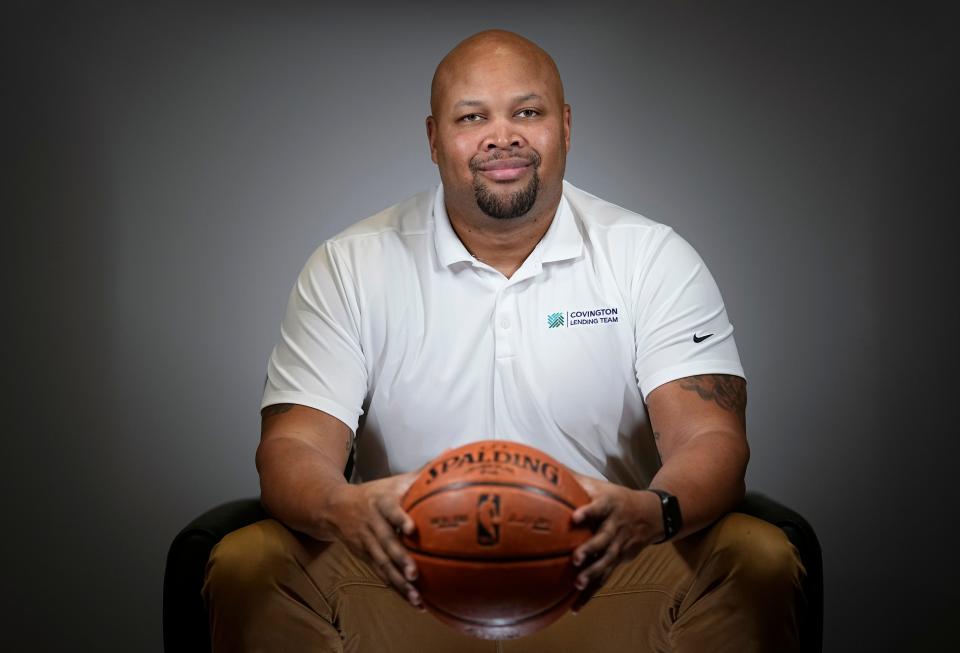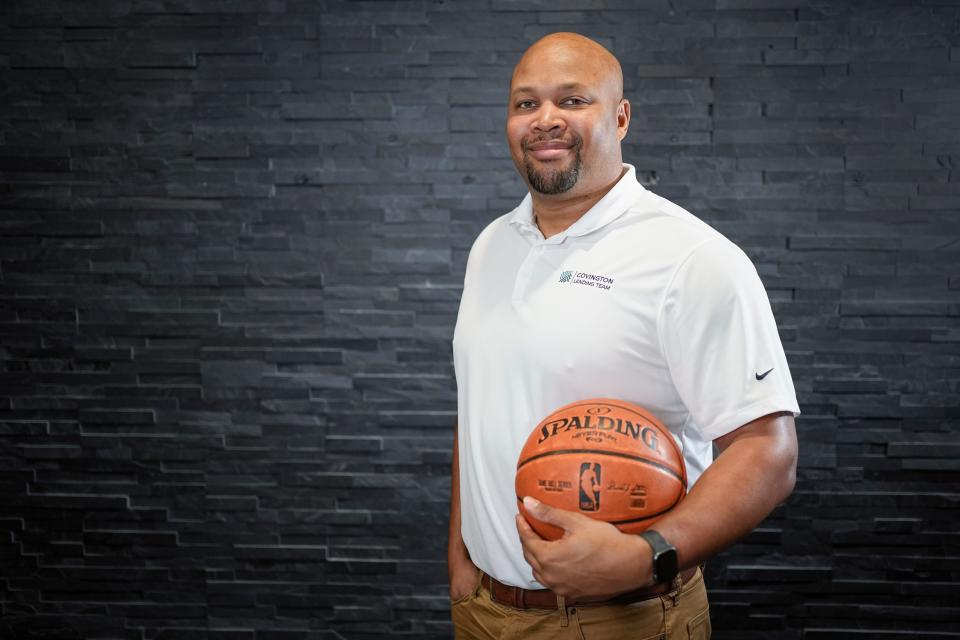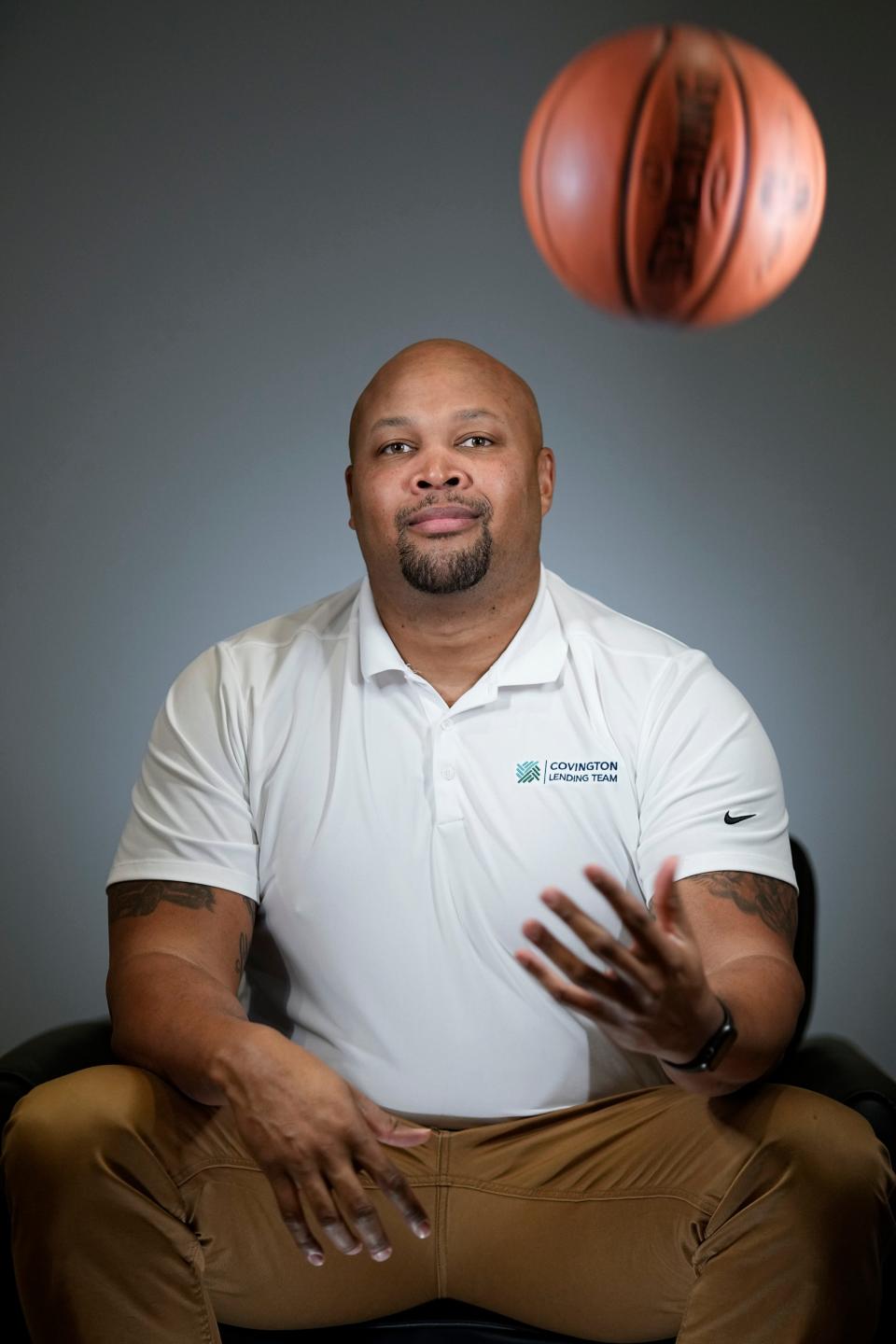Former college basketball player on his cardiac arrest: It 'hit me out of nowhere'

Austyn Covington still doesn't remember a single thing about the day it happened.
He doesn't remember sprinting on the treadmill at his local gym just before he collapsed.
Nor does he remember the trainer at Life Time Easton fitness club rushing to his side, performing chest compressions and eventually shocking him back to life with a defibrillator.
Convington, a lifelong athlete and former forward on the Ohio Dominican University men's basketball team, suffered sudden cardiac arrest in 2017.
>>Read More:Columbus man grateful for second chance after cardiac arrest days before Thanksgiving
Despite a heart condition he had known about for years, the life-threatening incident shocked Covington and his family when it happened about a decade or so after his collegiate basketball career ended. After that day at the fitness center, Covington woke up nearly a week later in a bed at Mount Carmel St. Ann's hospital.
"I'd been an athlete my whole life... I didn't want to believe it," Convington said about his heart condition and subsequent bout of cardiac arrest. "I was doing what I'm supposed to be doing to take care of myself. It just kind of hit me out of nowhere."
Sudden cardiac arrest kills more than 320,000 Americans a year — and just 10% of people who suffer such an attack survive, according to the Sudden Cardiac Arrest Foundation.

The condition often arises without warning signs and causes someone's heart to unexpectedly stop beating, according to the foundation, a Pennsylvania-based nonprofit. The heart becomes unable to pump blood, quickly depriving the brain and other vital organs of oxygen.
Timing can make all the difference when it comes to saving someone suffering from sudden cardiac arrest, the foundation says.
Quick intervention with CPR or an external defibrillator is critical to saving someone's life. But just a third of sudden cardiac arrest victims receive CPR from a bystander and only 5% are treated with a defibrillator, according to the foundation.
Immediate action is what Covington credits to his survival. When he collapsed at Life Time, trainer and fitness professional Joey Ensley heard him fall. He rushed over to find Covington without a pulse.
While that day is a chaotic blur to Ensley, he and Covington have formed a friendship that has continued in the years since.
>>Read More:'It could happen to me': High school athletes, trainers reflect on Damar Hamlin emergency
"The very first time I saw him afterward, he came in with a card to say thank you," Ensley said. "To see him well and back on his feet, I just remember tearing up."
Although it's been five years since Covington suffered cardiac arrest, he was suddenly reminded of his experience when Buffalo Bills safety Damar Hamlin collapsed on the field during a Jan. 2 game against the Cincinnati Bengals.
The incident drew national scrutiny and caused the NFL to scrap the regular season game between the two teams. It's also raised questions about screening for cardiac arrest and how prepared teams and schools are to respond to it in a timely manner, which can make all the difference.
Cardiac arrest can be caused by a variety of factors, including pre-existing heart conditions, said Dr. Curt Daniels, a sports cardiologist specializing in congenital heart disease at Ohio State University's Wexner Medical Center. For that reason, Daniels said cardiac arrest risk factors can be difficult to screen for and makes preparedness for it to happen critically important.
Whether it's a youth, high school, college or professional team, Daniels said they should make it a point to have people trained in how to administer CPR. They should also have a defibrillator on hand, he said.
A 2016 study found that sudden cardiac arrest occurs in 1 out of every 53,703 collegiate athletes, according to the National Institutes of Health. The incidence appears to be higher in various sports.

The 2016 study found that 1 in 8,978 men's college basketball players suffer from cardiac arrest, while 1 in 23,689 men's collegiate soccer players do and 1 in 35,951 may experience it.
While cases of sudden cardiac arrest among athletes may still be rare, Daniels said it's clear attacks like what happened to Damar Hamilin have a strong, outsized impact on sports and society as a whole. In the weeks since, Daniels said the medical center has received a lot of calls from concerned parents of student athletes.
"When we see athletes, they're considered the elite picture of health. These are people who are performing at a high level that most people can't," Daniels said. "So it's dramatic when this happens to somebody as young and as healthy as they are. It makes us pause and ask: 'How can this happen?'"
Covington remembers exactly how he felt when he heard about what happened to Hamlin. Covington's brother called to tell him and mentioned something to the effect of: that's what happened to you.
>>Read More:Injury to Bills' Damar Hamlin forces fans to deal with uncomfortable feelings | Rob Oller
Covington's heart sank, he said, because he knew what Hamlin and his family were going through.
Covington, now a volunteer with the American Heart Association's Columbus chapter, has managed to fully recover from his cardiac arrest. But it took years to get to where he is now.
After the attack, he spent several days in the hospital unconscious. When he woke up, his whole body was swollen and he discovered he had broken his leg when he fell on the treadmill at the gym.
Although Covington doesn't know Hamlin personally, he knows the Buffalo Bills player will face a long recovery and may never play football again.
"After everything we went through, I was definitely feeling a wide range of emotions for sure," Covington said. "You just can't really control it. It's a very traumatic thing, and when they said it happened (to Hamlin), I went into a little bit of panic mode for him."
mfilby@dispatch.com
@MaxFilby
This article originally appeared on The Columbus Dispatch: Despite rarity of athlete cardiac arrest, experts say preparing is key

